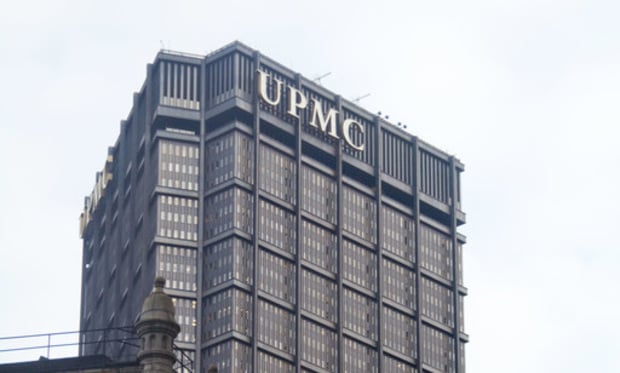Commonwealth Court Rejects Bid to Extend UPMC-Highmark Agreement
The consent decree between feuding health care giants Highmark and the University of Pittsburgh Medical Center remains on track to expire June 30 after a Commonwealth Court judge ruled June 14 that the agreement's modification provision does not apply to the termination date.
June 17, 2019 at 05:39 PM
4 minute read
 University of Pittsburgh Medical Center. Photo: Erika J Mitchell/Shutterstock.com
University of Pittsburgh Medical Center. Photo: Erika J Mitchell/Shutterstock.com
The consent decree between feuding health care giants Highmark and the University of Pittsburgh Medical Center remains on track to expire June 30 after a Commonwealth Court judge ruled June 14 that the agreement's modification provision does not apply to the termination date.
The Pennsylvania Office of Attorney General, backed by Highmark, is seeking the extension, arguing that a broad modification provision in the consent decree allows for the termination date to be changed and that allowing the consent decree to expire while the two companies remain engaged in litigation would substantially harm hundreds of thousands of western Pennsylvania residents. UPMC has disputed that any harm would occur and argues that the deadline cannot be changed.
This past April, Commonwealth Court Judge Robert Simpson ruled that, despite the modification provision, the end date was one aspect of the agreement that could not be altered. Simpson pointed to a ruling from last year by the state Supreme Court, which held that the June 30 termination date “was an unambiguous and material term of the consent decree.”
The Attorney General's Office appealed and, on May 28, the Pennsylvania Supreme Court ruled 4-3 to remand the case back to the Commonwealth Court for an expedited hearing on whether the parties intended, when they drafted the consent decree, for the deadline to be modifiable.
Those hearings occurred June 10 and 11 before Simpson.
On June 14, Simpson issued a 16-page opinion again siding with UPMC's interpretation of the consent agreement.
“The parties' outward and objective manifestations of assent, including planning for a transition period and the negotiations over the expiration provision, support the interpretation that the modification provision was not intended to override the termination/ expiration provision,” Simpson said.
The bitter fight between Highmark and UPMC centers on their inability to reach an agreement regarding UPMC's continued treatment of Highmark insureds. From 2002 until 2012, the companies operated in accordance with a 10-year provider agreement under which UPMC agreed to treat and bill patients with Highmark insurance according to negotiated rates, court documents said. But in 2011, ahead of the termination date of that agreement, UPMC announced it would not renew or renegotiate the pact, citing Highmark's planned affiliation with West Penn Allegheny Health System, which ultimately was approved, creating an entity in direct competition with UPMC.
Following the intervention of the Attorney General's Office, the state insurance commissioner and the secretary of health, UPMC and Highmark entered into separate but essentially identical consent decrees that allowed for Highmark subscribers to continue receiving in-network treatment from UPMC until June 30, court documents said. (Due to the acrimony between them, Highmark and UPMC both refused to sign a single document, so there are two separate consent decrees that differ only in that UPMC's version requires UPMC to comply with its requirements and Highmark's version requires Highmark to comply with its requirements, according to court records.)
In the June 14 ruling affirming the June 30 end date, Simpson agreed with UPMC's argument that allowing the termination date to be extended indefinitely would essentially mean allowing the consent agreement to continue in perpetuity.
“The OAG and Highmark insist that they had concerns that transcended the five-year termination/expiration provision,” Simpson said. ”Those concerns included UPMC's and Highmark's ongoing charitable responsibilities, and the ongoing need of consumers for access to high quality affordable health care. However, these concerns are never-ending. Stated differently, there will never be an end date for them. These perpetual concerns were known before the parties agreed on a specific termination/expiration provision. Given the actions of the UPMC board of directors, there is no reason to [believe] that UPMC would knowingly agree to such a perpetual undertaking.”
A spokesman for UPMC said in a statement, “UPMC is grateful the Commonwealth Court expeditiously reached this decision. We look forward to continuing to fulfill our long-standing charitable mission and serving the public with UPMC's world-class physicians and facilities.”
State Attorney General Josh Shapiro said in his own statement, “Make no mistake—our work here is not done. While we are disappointed in Judge Simpson's ruling, I won't quit on the people of Western Pennsylvania and we will continue to take steps to restore fairness to the health care system and give people access to the institutions their tax dollars built.”
Shapiro said in the statement that the office would “announce subsequent legal steps” this week.
Counsel for Highmark, Kim Watterson of Reed Smith in Pittsburgh, did not respond to a request for comment.
This content has been archived. It is available through our partners, LexisNexis® and Bloomberg Law.
To view this content, please continue to their sites.
Not a Lexis Subscriber?
Subscribe Now
Not a Bloomberg Law Subscriber?
Subscribe Now
NOT FOR REPRINT
© 2025 ALM Global, LLC, All Rights Reserved. Request academic re-use from www.copyright.com. All other uses, submit a request to [email protected]. For more information visit Asset & Logo Licensing.
You Might Like
View All
People in the News—Feb. 3, 2025—Antheil Maslow, Kang Haggerty, Saxton & Stump
3 minute read

Pennsylvania Law Schools Are Seeing Double-Digit Boosts in 2025 Applications
5 minute readTrending Stories
Who Got The Work
J. Brugh Lower of Gibbons has entered an appearance for industrial equipment supplier Devco Corporation in a pending trademark infringement lawsuit. The suit, accusing the defendant of selling knock-off Graco products, was filed Dec. 18 in New Jersey District Court by Rivkin Radler on behalf of Graco Inc. and Graco Minnesota. The case, assigned to U.S. District Judge Zahid N. Quraishi, is 3:24-cv-11294, Graco Inc. et al v. Devco Corporation.
Who Got The Work
Rebecca Maller-Stein and Kent A. Yalowitz of Arnold & Porter Kaye Scholer have entered their appearances for Hanaco Venture Capital and its executives, Lior Prosor and David Frankel, in a pending securities lawsuit. The action, filed on Dec. 24 in New York Southern District Court by Zell, Aron & Co. on behalf of Goldeneye Advisors, accuses the defendants of negligently and fraudulently managing the plaintiff's $1 million investment. The case, assigned to U.S. District Judge Vernon S. Broderick, is 1:24-cv-09918, Goldeneye Advisors, LLC v. Hanaco Venture Capital, Ltd. et al.
Who Got The Work
Attorneys from A&O Shearman has stepped in as defense counsel for Toronto-Dominion Bank and other defendants in a pending securities class action. The suit, filed Dec. 11 in New York Southern District Court by Bleichmar Fonti & Auld, accuses the defendants of concealing the bank's 'pervasive' deficiencies in regards to its compliance with the Bank Secrecy Act and the quality of its anti-money laundering controls. The case, assigned to U.S. District Judge Arun Subramanian, is 1:24-cv-09445, Gonzalez v. The Toronto-Dominion Bank et al.
Who Got The Work
Crown Castle International, a Pennsylvania company providing shared communications infrastructure, has turned to Luke D. Wolf of Gordon Rees Scully Mansukhani to fend off a pending breach-of-contract lawsuit. The court action, filed Nov. 25 in Michigan Eastern District Court by Hooper Hathaway PC on behalf of The Town Residences LLC, accuses Crown Castle of failing to transfer approximately $30,000 in utility payments from T-Mobile in breach of a roof-top lease and assignment agreement. The case, assigned to U.S. District Judge Susan K. Declercq, is 2:24-cv-13131, The Town Residences LLC v. T-Mobile US, Inc. et al.
Who Got The Work
Wilfred P. Coronato and Daniel M. Schwartz of McCarter & English have stepped in as defense counsel to Electrolux Home Products Inc. in a pending product liability lawsuit. The court action, filed Nov. 26 in New York Eastern District Court by Poulos Lopiccolo PC and Nagel Rice LLP on behalf of David Stern, alleges that the defendant's refrigerators’ drawers and shelving repeatedly break and fall apart within months after purchase. The case, assigned to U.S. District Judge Joan M. Azrack, is 2:24-cv-08204, Stern v. Electrolux Home Products, Inc.
Featured Firms
Law Offices of Gary Martin Hays & Associates, P.C.
(470) 294-1674
Law Offices of Mark E. Salomone
(857) 444-6468
Smith & Hassler
(713) 739-1250






